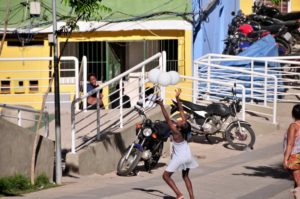Preparing for a Career in International PR
 In the summer of 2011, I was living in Rocinha, Rio’s de Janeiro largest favela or “shantytown”. I had opted out of a traditional study abroad for the chance to work on a photography book that documented the bustling daily life and joy of the community, a side of Rocinha rarely portrayed in the media. In Brazil, where favelas are largely synonymous with violence and drugs, the normalcy and strength of a community like Rocinha is commonly disregarded. With news increasingly focused on the Brazilian police program of “pacification” (decriminalization of the community in preparation for the upcoming World Cup and Olympics), the negative imagery is only further reinforced.
In the summer of 2011, I was living in Rocinha, Rio’s de Janeiro largest favela or “shantytown”. I had opted out of a traditional study abroad for the chance to work on a photography book that documented the bustling daily life and joy of the community, a side of Rocinha rarely portrayed in the media. In Brazil, where favelas are largely synonymous with violence and drugs, the normalcy and strength of a community like Rocinha is commonly disregarded. With news increasingly focused on the Brazilian police program of “pacification” (decriminalization of the community in preparation for the upcoming World Cup and Olympics), the negative imagery is only further reinforced.
A week after arriving to Rocinha, a member of my three-person team had his camera confiscated by the gang for shooting at the wrong time and place. After a lot of networking, I found myself face-to-face with one of Rio de Janeiro’s most notorious gang-lords to explain our project and presence in Rocinha. A 20-year-old with a semester of Portuguese under my belt, I pitched our project and the good we knew that it would bring to the community, with all the proceeds from the book going to local artists in Rocinha.
There isn’t much in life that prepares you for the moment you are standing in front of a gang lord, but this moment would prepare me for so many other challenges to come. Finding the right audience for your message and communicating in a language that is not your own challenges you; and the confidence to take on that challenge is key to what I do every day at the JeffreyGroup.
During my time working for JeffreyGroup, I have been confronted with challenges I didn’t even know could exist within the realm of PR. As a recent college graduate, I often think about what I would tell marketing and communications students about my job. The alumni visits to our classes always begged the question —how can I prepare for a career in the industry?
Of course the ability to write a killer press release or pitch a story are important, but just as important is a love for communication and the challenge the work presents—in many languages and across countries and cultures. A good PR person is tenacious and able to think on her feet. My time traveling and learning abroad has been crucial to my work with international offices, clients and media. It goes a long way to show someone you have put in the time and effort to learn about and travel to their home.
Today whenever I’m faced with a challenge, I try to channel the confidence I found standing on that street in Rio, and I feel the same excitement about the projects I work on every day. As a student, I strongly adhered to Mark Twain’s advice, “Don’t let schooling interfere with your education”, and I think this rings true for our industry as well: some of the most important PR skills are learned outside of an agency.

